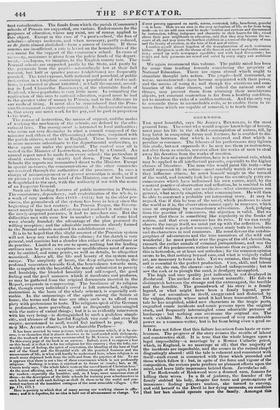it OOK W 00 D.
THE most beautiful, says Sir JOSHUA REYNOLDS, is the most general form. The artist wko would acquire knowledge of beauty,
must pass his life in the skilful contemplation of nature, till, by long habit in comparing forms and features, he is enabled to dis- tinguish between that which is universal and that which is peculiar or common. The labours of his predecessors may lighten this study, but not supersede it : he may use them as instructers, not obey them as oracles, nor ever allow the works of men to steal away his devotion from the works of creation.
In the form of a special direction, here is a universal rule, which may las applied to all intellectual pursuits, especially to the higher classes of literature. The umn who would paint life truly—who would represent life in action—must carefully watch its events as they influence others; be must himself mingle in the turmoil of the world, and intently look back upon the seemingly petty cir- cumstances which have influenced his own career, until, by the constant practice of observation and reflection, he is enabled to tell what are incidents, what are accidents—what circumstances are general, what merely singular, what commonplace. He will then be able to construct a probable yet interesting story. It may be argued, that if this be true of the novel, which professes to show the world as it is, the observation cannot apply to romance, which aims at surprising by extraordinary adventures. And, judging from the practice of romancers, time objection is valid. But we suspect that there is something like regularity in the freaks of nature, and that even romance has its rules. If we can rarely observe the image itself, we must put up with the reflection. He who would write a perfect romance, must study both its incidents and its characters in real romances. He must devour the autobio- graphies of adventurers and the true narratives of the wild and wonderful ; he must ponder over the pages of the old chroniclers, ransack the earlier annals of criminal jnrisprudence, and use the
labours of his predecessors rather as beacons than as guides. All this is heterodox, or at least not orthodox; for the common opinion seems to be, that nothing beyond care, and what is vulgarly called
art, are necessary to limn a tale. Yet we surmise, that the fitting soil is essential to the perfect production. Care, skill, and .labour —the air, the sun, the shower—are indeed indispensable: but to sow the rock or to plough the sand, is drudgery misapplied.
The high and rare 'quality just indicated, is not displayed in Roo/wood. The.author des not invent naturally. He fails to
distinguish between the strange and the extravagant, the terrible and the horrible. The groundwork of his story' is a family legend, or what might have been a family legend, pecu- liar if not anomalous in itself, exaggerated and distorted by the vulgar, through whose mind it had been transmitted. This tale he has amplified, added new characters in the tragic parts, engrafted comic incidents and comic persons upon the original stock, and frequently intermingled some adtnirable pictures of landscape : but nothing can overcome the original sin. The
work exhibits Mr. AINSWORTH possessed of very considerable power as a romance-writer, but is far from being even a good ro- mance.
It does not follow that this failure has arisen from haste or care- lessness. The progress of the story evinces the results of labour anti constructive skill. It is true that the whole hinges upon a legal impossibility—a marriage by a Roman Catholic priest, which, in England, is no marriage at all; that the majority of the incidents are improbable, and the scenes in the ruined chapel disgustingly absurd: still the tale is coherent and consistent with itself—each event is connected with those which preceded and those which follow it : but, in spite of the force and vigour of the composition, the serious parts produce no pleasant effects upon the mind, and leave little impression behind them. Incredulus odi.
The Rookwoods of Rookwood were a doomed race, famous for killing their wives. In a fit of jealousy, the founder of the family stabbedhis lady, despite her tears and protestations of' innocence: finding prayers useless, she turned to cursing, and sold herself to the Devil in her dying moments, on condition that her ban should operate upon the family. Amongst this


















 Previous page
Previous page